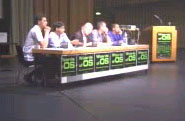 Diskussion
Neue Ökonomie? Diskussion
Neue Ökonomie?
Leitung: Armin Medosch
Armin Medosch: I think
that the speakers posed some pretty strong questions, and also requirements
and demands to the open source community, and I would be really glad if
people who are strongly part of that community would also speak up.
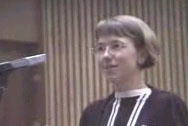 Audience:
I have missed two points in the whole discussion, and I will put them in
economics terms because they address your talk specifically. As an economist
you must of thought about the Tragedy of the Commons in relation to open
source. That means where is the incentive for people who do not contribute
to open source and similar endeavors to not only take out things but also
to put in things. Up until now I don't see the incentive. I can get my
Linux distribution for a hundred marks and then do nothing but just use
it. The second thing is that you mention a close parallel to the way science
is working. The scientist is paid for what she or he is doing without the
payment being directed to specific activities, like "I am paying you for
this paper", and it works. But the scientist is paid and the scientist
has the incentive of producing more work, because in general the scientist
is only paid for a couple of years. So how can we transfer this to open
source? I don't think that it will work on the basis of goodwill forever. Audience:
I have missed two points in the whole discussion, and I will put them in
economics terms because they address your talk specifically. As an economist
you must of thought about the Tragedy of the Commons in relation to open
source. That means where is the incentive for people who do not contribute
to open source and similar endeavors to not only take out things but also
to put in things. Up until now I don't see the incentive. I can get my
Linux distribution for a hundred marks and then do nothing but just use
it. The second thing is that you mention a close parallel to the way science
is working. The scientist is paid for what she or he is doing without the
payment being directed to specific activities, like "I am paying you for
this paper", and it works. But the scientist is paid and the scientist
has the incentive of producing more work, because in general the scientist
is only paid for a couple of years. So how can we transfer this to open
source? I don't think that it will work on the basis of goodwill forever.
Rishab Aiyer Ghosh:
Well, on the first question about the Tragedy of the Commons, that is something
that I didn't specifically refer to, but it's something I've addressed
by the fact that this model would not work in brickspace, it would not
work when you are actually dealing with real physical goods, for the reason
that the Tragedy of the Commons is there. The Tragedy of the Commons is
a very much a real world model. It has to do with diminishing resources.
The Tragedy of the Commons applies to things that are limited. It does
not apply on the Internet to the things that are not limited, which is,
the duplication. In the case of the Internet, the Cooking Pot works because
where the value generation comes from is not the fact that there is one
copy of Linux, it's the fact that there are six million of them. And that
does not cause any loss to anybody. But the Tragedy of the Commons specifically
does not arise because it's not as if there is any limited natural resource
that is going to be consumed.
What is an issue, is equitable
value flow: that it should not be the case that there are some people doing
all the work and everybody else is a free rider. In fact you can get hold
of a copy of Linux for free, you don't have to pay a hundred marks for
it, and you can still do nothing to contribute. But there are two things:
one is, as I pointed out yesterday in response to the panel, that Linus
Torvalds said that the user base is more valuable than the developer base
for the development of Linux because of the response that comes in. Of
course, you can sit back and not ever comment or say anything about Linux,
but when it crashes on you, you probably will say something which, in which
way you are contributing as a potential commentator for that. But more
importantly, at the moment, Linux is free for all. All these free things
on the Internet, not all but many of them are free for all, but you already
see situations, and there have always been situations where free riders
are not liked. If you go into a discussion for instance, into the #perl
channel on irc and ask stupid questions then they will boo you off. You
are not supposed to do that, you are not supposed to be not contributing.
In some cases you are contributing, not the way you think you are. As a
user you are not contributing to Linux by writing code, but you are contributing.
In some cases maybe you are not contributing at all, in which case you
will gradually discover that you can't benefit from it. If you are using
a copy of software that does not cost anyone to be reproduced many times,
then you are not causing a loss, then it's okay. But if you are causing
a loss, then it is not okay.
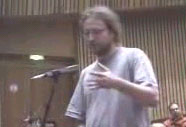 Audience:
I would like to address [Rishab Ghosh] as well. You said that the motivation
for contributing to an open source software project would be that I get
something in return, so it would be a rational economic motivation. But
to my experience, I received something, I got some benefit in using open
source software and became somewhat thankful. I think this is more of an
emotional reaction, and I want to know how you think about that. And a
second question to the first speaker: you said that open software would
easily survive software patents and you said it in just one sentence. Why
do you think so, why do you say that so easily? Audience:
I would like to address [Rishab Ghosh] as well. You said that the motivation
for contributing to an open source software project would be that I get
something in return, so it would be a rational economic motivation. But
to my experience, I received something, I got some benefit in using open
source software and became somewhat thankful. I think this is more of an
emotional reaction, and I want to know how you think about that. And a
second question to the first speaker: you said that open software would
easily survive software patents and you said it in just one sentence. Why
do you think so, why do you say that so easily?
Rishab Aiyer Ghosh:
There is one way of looking at your question: if someone is paying me a
salary and doesn't ever ask me to do any work, eventually I might feel
thankful for the money and decide to do some work for it. But it does not
really matter whether you get something in return after what you do or
before. As the guys who developed the Internet Movie Database told me they
felt that they were getting something out of the Internet so they wanted
to put something back. It does not have to be that you first write your
free software -- in fact it never is -- everybody is getting something
out of the Internet and the free software community much before they do
anything to contribute. As far as the second point, I don't remember saying
anything about software patents at all, but it's not really an issue because
open source is one economic response to the uneconomic model of intellectual
property and copyright that we have because copyright law is a way of putting
value on copies, copies are not economically something you can put a value
on in the Internet.
Norbert Szyperski: Let
me come back to the benefits once more. I personally believe that it is
benefitting once in a while just to be a member of a team. And you don't
ask all the time 'what will I give and what can I get out of it?' But being
with the group, being a member of the team is helpful for them and for
myself too. The second, if there is a social need that we should have open
software in our information infrastructure, then we will find a way to
get some money for the people creating it. The infrastructure work, mostly,
is not paid directly but it is paid for in one way or another. We decide
we need the road system, we need this and that, and we'll make use of it.
I don't know if open software is of that category, but if it is -- and
I assume it is, from what I heard in your discussion here -- then there
is no question, it will be financed in one way or another. There is not
only the way of paying through prices and markets, there are different
ways to pay for activities for us as a social group, as a community or
a nation or worldwide, if we really need them.
 Publikum:
Ich möchte weniger eine Frage stellen, als auf den ersten Redner reagieren
-- mit Verwunderung. Mich verwundert immer die aggressive Blauäugigkeit
der Betriebswirtschaft, die nicht einmal einen Gegensatz sieht zwischen
einer Ökonomie, die ihren eigenen Regeln in gar keiner Weise gehorcht,
und den Grundprinzipien einer Marktwirtschaft, deren Hohelied gleichzeitig
wieder gesungen wird, wie in ihrem Vortrag. Ich denke, wir müssen
doch zur Kenntnis nehmen, daß es menschliche Aktivitäten gibt,
die dem Marktprinzip in keiner Weise gehorchen. Wenn ein buddhistischer
Mönch einen halb Tag meditiert, müsste ein Betriebswirtschaftler
mit einigem Schamgefühl sagen: 'OK, geht micht nichts an, ist nicht
meine Baustelle. Es gibt ganz offensichtlich Aktivitäten, die meinen
Gesetzen nicht gehorchen.' Das passiert aber nicht, sondern was Sie machen
ist, auf den Bereich durchzugreifen, den Sie Freizeit nennen. Sie reden
von Freizeitgesellschaft. Ich kenne niemanden, der Freizeit hat. Ich kenne
nur Leute, die sind im Streß und sind stolz darauf. Sie greifen also
auf den Freizeitbereich durch und sagen 'wie prima, die Leute haben Freizeit.
Was können die denn produktives in ihrere Freizeit machen? Können
die denn nicht genau die Lücke füllen, die das Marktsystem offenläßt?'
Wir haben doch ein Marktsystem, das uns die Software, die wir 'proprietary'
nennen, beschert hat. Das ist das Produkt des Marktsystems. Bill Gates
ist der Exponent dieser Logik 'Geld gegen schlechte Software'. Ganz offensichtlich
gibt es einen Bedarf daran vorbei. Jetzt setzen Leute sich in ihrer Freizeit
hin und schreiben andere Programme, für die sie kein Geld bekommen,
und Sie sagen 'prima, das ist eine wunderbare Ergänzung, etwa wie
die Leute, die in der Krankenpflege arbeiten, obwohl sie wahnsinnig schlecht
bezahlt werden, wie viele andere Bereiche, die diese Gesellschaft eigentlich
nur noch am Markt vorbei abdecken kann. Ich hätte an die Ökonomie
den Anspruch, die Ökonomie soll uns mit dem versorgen, was wir brauchen.
Das gesellschaftliche ökonomische System als arbeitsteiliges ist dafür
da, uns gute Software zu vernünftigen Preisen zu verschaffen. Im Hardware-Bereich
funktioniert das. Die Computer werden billiger. Im Software-Bereich funktioniert
es offensichtlich nicht. In anderen gesellschaftlichen Bereichen funktioniert
es auch nicht. Deshalb wehre ich mich ganz entschieden dagegen, wenn Sie
als Betriebswirtschaftler sagen, 'ganz prima, gehorcht zwar nicht unserer
Logik, ist aber eine wunderbare Ergänzung. [Applaus] Publikum:
Ich möchte weniger eine Frage stellen, als auf den ersten Redner reagieren
-- mit Verwunderung. Mich verwundert immer die aggressive Blauäugigkeit
der Betriebswirtschaft, die nicht einmal einen Gegensatz sieht zwischen
einer Ökonomie, die ihren eigenen Regeln in gar keiner Weise gehorcht,
und den Grundprinzipien einer Marktwirtschaft, deren Hohelied gleichzeitig
wieder gesungen wird, wie in ihrem Vortrag. Ich denke, wir müssen
doch zur Kenntnis nehmen, daß es menschliche Aktivitäten gibt,
die dem Marktprinzip in keiner Weise gehorchen. Wenn ein buddhistischer
Mönch einen halb Tag meditiert, müsste ein Betriebswirtschaftler
mit einigem Schamgefühl sagen: 'OK, geht micht nichts an, ist nicht
meine Baustelle. Es gibt ganz offensichtlich Aktivitäten, die meinen
Gesetzen nicht gehorchen.' Das passiert aber nicht, sondern was Sie machen
ist, auf den Bereich durchzugreifen, den Sie Freizeit nennen. Sie reden
von Freizeitgesellschaft. Ich kenne niemanden, der Freizeit hat. Ich kenne
nur Leute, die sind im Streß und sind stolz darauf. Sie greifen also
auf den Freizeitbereich durch und sagen 'wie prima, die Leute haben Freizeit.
Was können die denn produktives in ihrere Freizeit machen? Können
die denn nicht genau die Lücke füllen, die das Marktsystem offenläßt?'
Wir haben doch ein Marktsystem, das uns die Software, die wir 'proprietary'
nennen, beschert hat. Das ist das Produkt des Marktsystems. Bill Gates
ist der Exponent dieser Logik 'Geld gegen schlechte Software'. Ganz offensichtlich
gibt es einen Bedarf daran vorbei. Jetzt setzen Leute sich in ihrer Freizeit
hin und schreiben andere Programme, für die sie kein Geld bekommen,
und Sie sagen 'prima, das ist eine wunderbare Ergänzung, etwa wie
die Leute, die in der Krankenpflege arbeiten, obwohl sie wahnsinnig schlecht
bezahlt werden, wie viele andere Bereiche, die diese Gesellschaft eigentlich
nur noch am Markt vorbei abdecken kann. Ich hätte an die Ökonomie
den Anspruch, die Ökonomie soll uns mit dem versorgen, was wir brauchen.
Das gesellschaftliche ökonomische System als arbeitsteiliges ist dafür
da, uns gute Software zu vernünftigen Preisen zu verschaffen. Im Hardware-Bereich
funktioniert das. Die Computer werden billiger. Im Software-Bereich funktioniert
es offensichtlich nicht. In anderen gesellschaftlichen Bereichen funktioniert
es auch nicht. Deshalb wehre ich mich ganz entschieden dagegen, wenn Sie
als Betriebswirtschaftler sagen, 'ganz prima, gehorcht zwar nicht unserer
Logik, ist aber eine wunderbare Ergänzung. [Applaus]
Norbert Szyperski: Als
erster Punkt: Betriebswirte untersuchen überhaupt nicht nur Unternehmungen
in ihrer Wirksamkeit, sondern auch Organisationsformen, die überhaupt
nichts mit marktwirtschaftlichen Tätigkeiten zu tun haben. Aber das
vielleicht nur am Rande. Mir wäre viel wohler, muß ich auch
sagen, wenn ich, wie Sie eben gesagt haben, für gutes Geld nicht nur
schlechte Software -- ich kann das gar nicht so beurteilen, das wird immer
so hingestellt, daß alle Software am Markt schlecht ist und alle,
die Sie machen ist gut -- da habe ich meine Bedenken, aber immerhin, mir
wäre es sympathischer, wenn ich für gutes Geld gute Software
bekäme. Hier stellt sich natürlich die Frage, warum die Initiativen,
die Sie zur guten Software hin führen, verweigern, wenn es darum geht,
aus dieser guten Software gute Marktprodukte werden zu lassen. Das wäre
doch eine natürliche Folge. Was ich sagen will, ist nur, mir ist jeder
Weg recht, der dazu führt, daß die Versorgung über den
Markt -- und wenn es eben nicht klappt, in Bedrohung des Marktes -- im
Hinblick auf diejenigen, die etwas haben wollen, geordnete und, wenn Sie
so wollen, schrittweise verändert wird. Und da sehe ich überhaupt
keine Widersprüche zum ökonomischenn Prinzip, sondern das ist
eine Gemeinschaftsaufgabe und das ist doch sehr wichtig. Sie könnten
genauso gut sagen, 'warum finanzieren wir denn die ganzen Universitäten
und die Wissenschaftler? Die könnten wir doch eigentlich auch direkt
in den Marktprozeß einbeziehen.' Keiner wird das verlangen. [Gelächter]
Wir können doch bei jeder anderen Leistung, die wir als Gemeinschaft
wollen, sagen, 'prima, wenn der Markt es macht.' Ich bin sehr dafür,
daß diese Grenzen immer mal wieder ausprobiert und verschoben werden.
Deregulierung und Privatisierung haben uns in vielen Bereichen enorm viel
gebracht. Warum soll jetzt nicht mal ein Phase darin bestehen, daß
konzentrierte gemeinsame Anstrengungen dazu führen, daß eine
Branche auf Trott gebracht wird. Ich sehe da keinen Widerspruch.
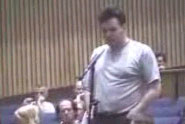 Publikum:
Ich habe in der Schule gelernt, daß die Definition von Ökonomie
lautet 'Handeln mit knappen Gütern.' Nun ist es so, daß freie
Software kein knappes Gut ist, und somit ist jede Idee, da irgendeine Ökonomie
zu sehen, eigentlich Unsinn. Das ist der eine Punt, den ich anmerken wollte,
und der zweite ist: Wir haben gestern gesehen, daß viele Leute freie
Software in ihrer Freizeit machen und dafür nicht bezahlt werden.
Das ist der generelle Tenor. Es gibt ein paar Ausnahmen davon, aber im
großen und ganzen werden die Leute dafür nicht bezahlt. Desweiteren
ist derjenige Leader eines Projektes, der der beste Programmierer
ist. Das haben wir heute noch einmal als Zitat hier an der Wand gesehen.
D.h., jeder arbeitet nach seinen Fähigkeiten, und der, der am besten
etwas zustande bringt, übernimmt eine gewisse Vorreiterrolle in dieser
Gruppe. Desweiteren hat jeder, der an einem solchen Projekt arbeitet, sein
Auskommen. Jetzt wollte ich noch eine zweite Definition einwerfen, die
ich auch aus der Schule mitbekommen habe: Kommunismus ist, jeder nach seinen
Fähigkeiten, jedem nach seinen Bedürfnissen. Somit sage ich einfach
mal: freie Software ist eine neue Form von Kommunismus und eigentlich im
Prinzip nichts Neues und mit kapitalistischen Systemen nicht vereinbar,
und deshalb kann auch heutzutage heute keiner damit richtig Geld verdienen.
[Applaus] Publikum:
Ich habe in der Schule gelernt, daß die Definition von Ökonomie
lautet 'Handeln mit knappen Gütern.' Nun ist es so, daß freie
Software kein knappes Gut ist, und somit ist jede Idee, da irgendeine Ökonomie
zu sehen, eigentlich Unsinn. Das ist der eine Punt, den ich anmerken wollte,
und der zweite ist: Wir haben gestern gesehen, daß viele Leute freie
Software in ihrer Freizeit machen und dafür nicht bezahlt werden.
Das ist der generelle Tenor. Es gibt ein paar Ausnahmen davon, aber im
großen und ganzen werden die Leute dafür nicht bezahlt. Desweiteren
ist derjenige Leader eines Projektes, der der beste Programmierer
ist. Das haben wir heute noch einmal als Zitat hier an der Wand gesehen.
D.h., jeder arbeitet nach seinen Fähigkeiten, und der, der am besten
etwas zustande bringt, übernimmt eine gewisse Vorreiterrolle in dieser
Gruppe. Desweiteren hat jeder, der an einem solchen Projekt arbeitet, sein
Auskommen. Jetzt wollte ich noch eine zweite Definition einwerfen, die
ich auch aus der Schule mitbekommen habe: Kommunismus ist, jeder nach seinen
Fähigkeiten, jedem nach seinen Bedürfnissen. Somit sage ich einfach
mal: freie Software ist eine neue Form von Kommunismus und eigentlich im
Prinzip nichts Neues und mit kapitalistischen Systemen nicht vereinbar,
und deshalb kann auch heutzutage heute keiner damit richtig Geld verdienen.
[Applaus]
Bernd Lutterbeck: Ich
kann es mir insofern leicht machen, nicht nur, daß ich jetzt Deutsch
rede, sondern daß ich sage, ich bin ja nicht der Ökonom. Aber:
natürlich setzt Recht auf Ökonomie auf. Ich sage, ihre Knappheitsgeschichten,
das akzeptiere ich, gelten hier in der Tat nicht mehr, und meine Antwort
darauf ist, daß ein überkommenes ökonomisches Modell
sich, jedenfalls teilweise, überlebt hat. Deswegen suche ich nach
anderen Strukturen, die die von mir oder von Keii etablierten, erkannten
Werte baut. Ob das, was dann entsteht, aber wirklich eine Alternative zur
Marktwirtschaft ist, bezweifle ich ganz und gar. Sondern das Treibende,
das wirklich Neue an der Open Source ist, daß Open Source erkannt
hat, daß das Netz selber der Markt ist. Und dieses Netz benutzen
Sie, um Ihre Produkte zu entwickeln. Entstehen wird -- davon bin ich fest
überzeugt -- ein anderer Gesellschaftstypus, aber er wird immer noch
wesentliche Elemente von unserem heutigen System haben, insbesondere das
Wettbewerbsprinzip.
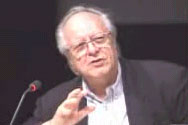 Norbert
Szyperski: Der Kern der knappen Güter ist definiert worden bezogen
auf materielle Güter und spezifische Dienstleistungen. Ich hatte ausdrücklich
gesagt, daß wir die Rahmenbedingungen, die sich jetzt ergeben, nutzen
müssen, um neu zu überdenken, wo in dieser -- und ich habe den
Ausdruck 'Internet-Ökonomie' jetzt schlagwortartig verwendet, -- daß
wir diese Zusammenhänge neu überdenken müssen. Aber, wissen
Sie, wenn Sie davon ausgehen, daß das was wir im Leben tun, nur
im ökonomischen Bereich liegt und daß wir ein Gesellschaftsverständnis
haben, das nur die marktwirtschaftliche Komponente unser Leben insgesamt
bestimmt -- das bestimmt ganz wesentliche und für mein Gefühl
unersetzliche Teile, aber man muß nicht buddhistischer Mönch
sein, um Phasen der Einkehr zu pflegen -- wo überhaupt keine Frage
des Geldes, und dennoch ein Austausch von gegenseitigen Leistungen erfolgt.
Das ist nicht bloß in der Familie oder der Gemeinde so. Ich habe
gerade diese Beispiele genannt. Und wenn jetzt diese Arten des gemeinsamen
Wirkens, bedingt durch Netze und Technik, über die regionalen Communities
hinausgehen, dann halte ich das erst einmal für eine sehr, sehr positive
Sache, unbeschadet der Frage, wie die Marktwirtschaft wirkt. Sie haben
auch im Bereich der Psychologie, der Seelsorge Dinge, die nicht gegen Geld
gekauft werden können und nicht gekauft werden müssen, und andere
Gurus verkaufen das erste Trainingsprogramm zu irgeneiner Frage gegen viel
Geld, und alle Menschen laufen hin und bezahlen es. D.h. die Frage der
Knappheit ist nicht allein eine Frage des Angebots, sondern von der speziellen
Betrachtung der Angebote aus der Sicht der Nachfrage, so daß manche
Dinge ganz schnell Ladenhüter werden können, obwohl sie an sich
vom Angebot physisch gesehen knapp sind. Das ist also differenzierter als
diese einfache Betrachtungsweise. Gehen Sie bitte davon aus, daß
Sie, wenn wir solche Themen diskutieren, den Betriebswirt nicht auf die
eine Frage beschränken können, wie macht eine Unternehmung das. Norbert
Szyperski: Der Kern der knappen Güter ist definiert worden bezogen
auf materielle Güter und spezifische Dienstleistungen. Ich hatte ausdrücklich
gesagt, daß wir die Rahmenbedingungen, die sich jetzt ergeben, nutzen
müssen, um neu zu überdenken, wo in dieser -- und ich habe den
Ausdruck 'Internet-Ökonomie' jetzt schlagwortartig verwendet, -- daß
wir diese Zusammenhänge neu überdenken müssen. Aber, wissen
Sie, wenn Sie davon ausgehen, daß das was wir im Leben tun, nur
im ökonomischen Bereich liegt und daß wir ein Gesellschaftsverständnis
haben, das nur die marktwirtschaftliche Komponente unser Leben insgesamt
bestimmt -- das bestimmt ganz wesentliche und für mein Gefühl
unersetzliche Teile, aber man muß nicht buddhistischer Mönch
sein, um Phasen der Einkehr zu pflegen -- wo überhaupt keine Frage
des Geldes, und dennoch ein Austausch von gegenseitigen Leistungen erfolgt.
Das ist nicht bloß in der Familie oder der Gemeinde so. Ich habe
gerade diese Beispiele genannt. Und wenn jetzt diese Arten des gemeinsamen
Wirkens, bedingt durch Netze und Technik, über die regionalen Communities
hinausgehen, dann halte ich das erst einmal für eine sehr, sehr positive
Sache, unbeschadet der Frage, wie die Marktwirtschaft wirkt. Sie haben
auch im Bereich der Psychologie, der Seelsorge Dinge, die nicht gegen Geld
gekauft werden können und nicht gekauft werden müssen, und andere
Gurus verkaufen das erste Trainingsprogramm zu irgeneiner Frage gegen viel
Geld, und alle Menschen laufen hin und bezahlen es. D.h. die Frage der
Knappheit ist nicht allein eine Frage des Angebots, sondern von der speziellen
Betrachtung der Angebote aus der Sicht der Nachfrage, so daß manche
Dinge ganz schnell Ladenhüter werden können, obwohl sie an sich
vom Angebot physisch gesehen knapp sind. Das ist also differenzierter als
diese einfache Betrachtungsweise. Gehen Sie bitte davon aus, daß
Sie, wenn wir solche Themen diskutieren, den Betriebswirt nicht auf die
eine Frage beschränken können, wie macht eine Unternehmung das.
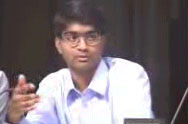 Rishab
Aiyer Ghosh: I would like to say that there is a distinction between
the software and the lines of code which can be copied a million times
and therefore it is not scarce and the creation of it. It needs people
to create it. Programmers are scarce. That is what is economically valuable.
I would also like to refer to the question about what makes a loss. If
I am not compensated for the creation of something then I'm making a loss.
If I am not compensated for the one million and first copy of the thing
that I made then I'm not making a loss, economically. Because there is
no scarcity there, in making the copies, but there is a scarcity in the
creation. So I need to be paid for the creation. It doesn't matter how
much I'm paid. I decide with everybody else, which is the point I was trying
to make about Microsoft and their pricing strategy. I'm not going to get
into the issue of whether Microsoft should make 20 billion Dollars out
of Windows or not. If they decide they want to make that much money out
of Windows that's their problem. If they don't make it they won't release
it. That's fine. But how they make it has to pay for the creation of the
product and not for the copying of the product. The creation is scarce,
but the copying is not. Rishab
Aiyer Ghosh: I would like to say that there is a distinction between
the software and the lines of code which can be copied a million times
and therefore it is not scarce and the creation of it. It needs people
to create it. Programmers are scarce. That is what is economically valuable.
I would also like to refer to the question about what makes a loss. If
I am not compensated for the creation of something then I'm making a loss.
If I am not compensated for the one million and first copy of the thing
that I made then I'm not making a loss, economically. Because there is
no scarcity there, in making the copies, but there is a scarcity in the
creation. So I need to be paid for the creation. It doesn't matter how
much I'm paid. I decide with everybody else, which is the point I was trying
to make about Microsoft and their pricing strategy. I'm not going to get
into the issue of whether Microsoft should make 20 billion Dollars out
of Windows or not. If they decide they want to make that much money out
of Windows that's their problem. If they don't make it they won't release
it. That's fine. But how they make it has to pay for the creation of the
product and not for the copying of the product. The creation is scarce,
but the copying is not.
 Audience:
The two of you defend competition as the main principle for organizing
societies. I think that Linux is the best example for a system that doesn't
work with competition but on the basis of cooperation, at least for the
most part. I wonder how the two of you can simply defend the old competition
thesis. Audience:
The two of you defend competition as the main principle for organizing
societies. I think that Linux is the best example for a system that doesn't
work with competition but on the basis of cooperation, at least for the
most part. I wonder how the two of you can simply defend the old competition
thesis.
Bernd Lutterbeck: The
incentive for developing it was that a special system was not good enough.
So, of course, the incentive for Linus was competition.
Rishab Aiyer Ghosh:
I would like to point out that far from being a collaborative product,
Linux is not collaborative, nor is any open source product. Collaboration
without competition would mean that you do not have any notion of a better
product or a better component replacing an old one. There are innumerable
situations in the history of open source where someone has written something
that is better than something that another person has written, and that's
what comes into the release. People make improvements on other people's
code, and the improvements that work the best are what get used more.
Audience: That's how
Microsoft works?
Rishab Aiyer Ghosh:
That's how it works in all software. It most certainly works that way in
free software, too. If you simply look at how BSD is used or Linux or various
components. Who decides that my driver is the one that gets used and not
yours? Whoever likes mine will use mine. The fact is that there is no committee
that lays down the law that we are all in a team, and you do this and you
do that. It's not like that. Some programmer decides to do something. Others
like what he's done, and it gets used. Most certainly there's competition
there. It might not be competition in the same price-based way as it is
in a company. In fact, in Microsoft there is no competitin within a team.
Bill Gates or whoever decides that this is our team, you are in charge
of the mailserver, you are in charge of something else. Then he writes
the mailserver, and no matter how bad it is it gets into the final product.
There is no competition in Microsoft. There is competition in the Linux
community. [Applause]
 Publikum:
Ich habe den Eindruck, daß Copyright als solches sich scheinbar überlebt
hat. Es wird von den Usern immer weniger akzeptiert. Linux ist eigentlich
nur der positivste Aspekt von der ganzen Sache. Wenn ich mir die Entwicklung
im Musikmarkt angucke oder auch die frei verfügbaren Star Wars-Kopien,
die im Internet rumgeistern, hat sich bereits ein riesiger Schattenmarkt
etabliert, teilweise mit direktem Kontakt in die Illegalität, der
zeigt, daß die Imperialisten einen Großteil ihrer Macht verloren
haben. Zum Teil ist es auch eine akzeptierte Politik. Zeige mir einen Microsoft-Entwickler
und ich zeige dir jemanden, der für 20.000 DM Software geklaut hat,
aber nicht verfolgt wird, weil es von der Firma aus marketingtechnischen
Gründen akzeptiert wird Publikum:
Ich habe den Eindruck, daß Copyright als solches sich scheinbar überlebt
hat. Es wird von den Usern immer weniger akzeptiert. Linux ist eigentlich
nur der positivste Aspekt von der ganzen Sache. Wenn ich mir die Entwicklung
im Musikmarkt angucke oder auch die frei verfügbaren Star Wars-Kopien,
die im Internet rumgeistern, hat sich bereits ein riesiger Schattenmarkt
etabliert, teilweise mit direktem Kontakt in die Illegalität, der
zeigt, daß die Imperialisten einen Großteil ihrer Macht verloren
haben. Zum Teil ist es auch eine akzeptierte Politik. Zeige mir einen Microsoft-Entwickler
und ich zeige dir jemanden, der für 20.000 DM Software geklaut hat,
aber nicht verfolgt wird, weil es von der Firma aus marketingtechnischen
Gründen akzeptiert wird
Bernd Lutterbeck: Das
war die Viertelstunde, die ich nicht geredet habe, hätte ich über
das Problem geredet. Ich glaube, daß Sie das Problem richtig sehen.
Das Urheberrecht ist ja die Materie, an der sich das entscheidet, nicht
das Patentrecht, wie machmal die Rede ist. Da ist es leider noch nicht
so, wie Sie sagen, sondern im Gegenteil, die europäische und die deutsche
Politik haben ganz stramm im letzten Jahr das Urheberrecht neu gefaßt,
mit dem Ziel, -- Programm sind sozusagen die Technologie der Vergangenheit
-- vor allem Datenbanken voll unter das Regime des Urheberrechts zu stellen.
Und das ist in der Tat eine ganz schlechte Entwicklung, die in Deutschland
von kaum jemandem bemerkt wurde. Und die führt in der Tat dazu, wenn
dieser Weg sich durchsetzt, dann sehe ich schwarz für Open Source.
Wohlgemerkt: nicht aus Patentrechtsgründen, was ja immer wieder die
Rede ist, sondern das Urheberrecht, das ist der Hebel. Und dann ist die
Konsequenz: man muß alles tun, um das bekannte Urheberrecht -- Sie
haben völlig recht -- völlig zu verändern, aber das machen
die normalen Juristen nicht mit. Ever the imperialist.
 Pit
Schultz: Ich bin kein Jurist, trotzdem eine kleine Frage. Sie sprechen
vom Urheberrecht. Geht es nicht eigentlich um das Eigentumsrecht, um das
Privatrecht und damit zruückgehend auf ein sehr altes Recht, das römische
Recht, was ja auch nicht existiert seit es Menschen gibt, sondern auch
irgendwann erfunden wurde. Sprechen wir nicht eigentlich über eine
ganz grundlegendes Prinzip in der Gesetzsprechung, was hier neu definiert
wird in der offenen Gesellschaft, nämlich das Eigentumsrecht. Pit
Schultz: Ich bin kein Jurist, trotzdem eine kleine Frage. Sie sprechen
vom Urheberrecht. Geht es nicht eigentlich um das Eigentumsrecht, um das
Privatrecht und damit zruückgehend auf ein sehr altes Recht, das römische
Recht, was ja auch nicht existiert seit es Menschen gibt, sondern auch
irgendwann erfunden wurde. Sprechen wir nicht eigentlich über eine
ganz grundlegendes Prinzip in der Gesetzsprechung, was hier neu definiert
wird in der offenen Gesellschaft, nämlich das Eigentumsrecht.
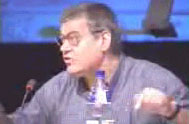 Bernd
Lutterbeck: Ich hätte das, wie gesagt ausgeführt. Es ist
aber kompliziert. Das Problem ist, das Urheberrecht wird, bei uns in Deutschland
jedenfalls, diskutiert als eine Sondermaterie von fixen, klugen Anwälten.
In Wahrheit ist es aber die Hauptmaterie der Informationsgesellschaft überhaupt
geworden. Und dann ist es so, daß das Urheberrecht und das Verfassungsrecht
ganz eng beisammen liegen. So würde ich sagen, weniger das Eigentum
als die Informationsfreiheite. In den USA, wieder kann man das auf der
von mir genannten Seite gut sehen, ist alles voll von denen und in Deutschland
gibt es außer uns praktisch niemanden, der versucht, da mit lang
zu gehen. Sie haben völlig recht, da ist das Thema. Da müßte
auch Open Source hin, vorausgesetzt, man erweitert den Rahmen so, wie ich
das vorgeschlagen habe. Bernd
Lutterbeck: Ich hätte das, wie gesagt ausgeführt. Es ist
aber kompliziert. Das Problem ist, das Urheberrecht wird, bei uns in Deutschland
jedenfalls, diskutiert als eine Sondermaterie von fixen, klugen Anwälten.
In Wahrheit ist es aber die Hauptmaterie der Informationsgesellschaft überhaupt
geworden. Und dann ist es so, daß das Urheberrecht und das Verfassungsrecht
ganz eng beisammen liegen. So würde ich sagen, weniger das Eigentum
als die Informationsfreiheite. In den USA, wieder kann man das auf der
von mir genannten Seite gut sehen, ist alles voll von denen und in Deutschland
gibt es außer uns praktisch niemanden, der versucht, da mit lang
zu gehen. Sie haben völlig recht, da ist das Thema. Da müßte
auch Open Source hin, vorausgesetzt, man erweitert den Rahmen so, wie ich
das vorgeschlagen habe.
Edmund Humenberger:
Ich möchte nur einen kleinen Hinweis geben. Alle Open-Source-Programmierer
generieren Wert, und dieser Wert ist nicht nur bei den Open-Source-Programmierern
in Form von Geld vorhanden, sondern er wird kommendes Jahr in Form von
Geld bei der Firma RedHat und bei der Firma SuSE liegen, die an die Börse
gehen und 1-2 Milliarden Dollar machen werden und mit unserem Wert in der
Tasche dann abhauen werden. Danke.
(Transkription
Christopher Kelty & vgrass)
|
 Diskussion
Neue Ökonomie?
Diskussion
Neue Ökonomie?
 Audience:
I have missed two points in the whole discussion, and I will put them in
economics terms because they address your talk specifically. As an economist
you must of thought about the Tragedy of the Commons in relation to open
source. That means where is the incentive for people who do not contribute
to open source and similar endeavors to not only take out things but also
to put in things. Up until now I don't see the incentive. I can get my
Linux distribution for a hundred marks and then do nothing but just use
it. The second thing is that you mention a close parallel to the way science
is working. The scientist is paid for what she or he is doing without the
payment being directed to specific activities, like "I am paying you for
this paper", and it works. But the scientist is paid and the scientist
has the incentive of producing more work, because in general the scientist
is only paid for a couple of years. So how can we transfer this to open
source? I don't think that it will work on the basis of goodwill forever.
Audience:
I have missed two points in the whole discussion, and I will put them in
economics terms because they address your talk specifically. As an economist
you must of thought about the Tragedy of the Commons in relation to open
source. That means where is the incentive for people who do not contribute
to open source and similar endeavors to not only take out things but also
to put in things. Up until now I don't see the incentive. I can get my
Linux distribution for a hundred marks and then do nothing but just use
it. The second thing is that you mention a close parallel to the way science
is working. The scientist is paid for what she or he is doing without the
payment being directed to specific activities, like "I am paying you for
this paper", and it works. But the scientist is paid and the scientist
has the incentive of producing more work, because in general the scientist
is only paid for a couple of years. So how can we transfer this to open
source? I don't think that it will work on the basis of goodwill forever.
 Audience:
I would like to address [Rishab Ghosh] as well. You said that the motivation
for contributing to an open source software project would be that I get
something in return, so it would be a rational economic motivation. But
to my experience, I received something, I got some benefit in using open
source software and became somewhat thankful. I think this is more of an
emotional reaction, and I want to know how you think about that. And a
second question to the first speaker: you said that open software would
easily survive software patents and you said it in just one sentence. Why
do you think so, why do you say that so easily?
Audience:
I would like to address [Rishab Ghosh] as well. You said that the motivation
for contributing to an open source software project would be that I get
something in return, so it would be a rational economic motivation. But
to my experience, I received something, I got some benefit in using open
source software and became somewhat thankful. I think this is more of an
emotional reaction, and I want to know how you think about that. And a
second question to the first speaker: you said that open software would
easily survive software patents and you said it in just one sentence. Why
do you think so, why do you say that so easily?
 Publikum:
Ich möchte weniger eine Frage stellen, als auf den ersten Redner reagieren
-- mit Verwunderung. Mich verwundert immer die aggressive Blauäugigkeit
der Betriebswirtschaft, die nicht einmal einen Gegensatz sieht zwischen
einer Ökonomie, die ihren eigenen Regeln in gar keiner Weise gehorcht,
und den Grundprinzipien einer Marktwirtschaft, deren Hohelied gleichzeitig
wieder gesungen wird, wie in ihrem Vortrag. Ich denke, wir müssen
doch zur Kenntnis nehmen, daß es menschliche Aktivitäten gibt,
die dem Marktprinzip in keiner Weise gehorchen. Wenn ein buddhistischer
Mönch einen halb Tag meditiert, müsste ein Betriebswirtschaftler
mit einigem Schamgefühl sagen: 'OK, geht micht nichts an, ist nicht
meine Baustelle. Es gibt ganz offensichtlich Aktivitäten, die meinen
Gesetzen nicht gehorchen.' Das passiert aber nicht, sondern was Sie machen
ist, auf den Bereich durchzugreifen, den Sie Freizeit nennen. Sie reden
von Freizeitgesellschaft. Ich kenne niemanden, der Freizeit hat. Ich kenne
nur Leute, die sind im Streß und sind stolz darauf. Sie greifen also
auf den Freizeitbereich durch und sagen 'wie prima, die Leute haben Freizeit.
Was können die denn produktives in ihrere Freizeit machen? Können
die denn nicht genau die Lücke füllen, die das Marktsystem offenläßt?'
Wir haben doch ein Marktsystem, das uns die Software, die wir 'proprietary'
nennen, beschert hat. Das ist das Produkt des Marktsystems. Bill Gates
ist der Exponent dieser Logik 'Geld gegen schlechte Software'. Ganz offensichtlich
gibt es einen Bedarf daran vorbei. Jetzt setzen Leute sich in ihrer Freizeit
hin und schreiben andere Programme, für die sie kein Geld bekommen,
und Sie sagen 'prima, das ist eine wunderbare Ergänzung, etwa wie
die Leute, die in der Krankenpflege arbeiten, obwohl sie wahnsinnig schlecht
bezahlt werden, wie viele andere Bereiche, die diese Gesellschaft eigentlich
nur noch am Markt vorbei abdecken kann. Ich hätte an die Ökonomie
den Anspruch, die Ökonomie soll uns mit dem versorgen, was wir brauchen.
Das gesellschaftliche ökonomische System als arbeitsteiliges ist dafür
da, uns gute Software zu vernünftigen Preisen zu verschaffen. Im Hardware-Bereich
funktioniert das. Die Computer werden billiger. Im Software-Bereich funktioniert
es offensichtlich nicht. In anderen gesellschaftlichen Bereichen funktioniert
es auch nicht. Deshalb wehre ich mich ganz entschieden dagegen, wenn Sie
als Betriebswirtschaftler sagen, 'ganz prima, gehorcht zwar nicht unserer
Logik, ist aber eine wunderbare Ergänzung. [Applaus]
Publikum:
Ich möchte weniger eine Frage stellen, als auf den ersten Redner reagieren
-- mit Verwunderung. Mich verwundert immer die aggressive Blauäugigkeit
der Betriebswirtschaft, die nicht einmal einen Gegensatz sieht zwischen
einer Ökonomie, die ihren eigenen Regeln in gar keiner Weise gehorcht,
und den Grundprinzipien einer Marktwirtschaft, deren Hohelied gleichzeitig
wieder gesungen wird, wie in ihrem Vortrag. Ich denke, wir müssen
doch zur Kenntnis nehmen, daß es menschliche Aktivitäten gibt,
die dem Marktprinzip in keiner Weise gehorchen. Wenn ein buddhistischer
Mönch einen halb Tag meditiert, müsste ein Betriebswirtschaftler
mit einigem Schamgefühl sagen: 'OK, geht micht nichts an, ist nicht
meine Baustelle. Es gibt ganz offensichtlich Aktivitäten, die meinen
Gesetzen nicht gehorchen.' Das passiert aber nicht, sondern was Sie machen
ist, auf den Bereich durchzugreifen, den Sie Freizeit nennen. Sie reden
von Freizeitgesellschaft. Ich kenne niemanden, der Freizeit hat. Ich kenne
nur Leute, die sind im Streß und sind stolz darauf. Sie greifen also
auf den Freizeitbereich durch und sagen 'wie prima, die Leute haben Freizeit.
Was können die denn produktives in ihrere Freizeit machen? Können
die denn nicht genau die Lücke füllen, die das Marktsystem offenläßt?'
Wir haben doch ein Marktsystem, das uns die Software, die wir 'proprietary'
nennen, beschert hat. Das ist das Produkt des Marktsystems. Bill Gates
ist der Exponent dieser Logik 'Geld gegen schlechte Software'. Ganz offensichtlich
gibt es einen Bedarf daran vorbei. Jetzt setzen Leute sich in ihrer Freizeit
hin und schreiben andere Programme, für die sie kein Geld bekommen,
und Sie sagen 'prima, das ist eine wunderbare Ergänzung, etwa wie
die Leute, die in der Krankenpflege arbeiten, obwohl sie wahnsinnig schlecht
bezahlt werden, wie viele andere Bereiche, die diese Gesellschaft eigentlich
nur noch am Markt vorbei abdecken kann. Ich hätte an die Ökonomie
den Anspruch, die Ökonomie soll uns mit dem versorgen, was wir brauchen.
Das gesellschaftliche ökonomische System als arbeitsteiliges ist dafür
da, uns gute Software zu vernünftigen Preisen zu verschaffen. Im Hardware-Bereich
funktioniert das. Die Computer werden billiger. Im Software-Bereich funktioniert
es offensichtlich nicht. In anderen gesellschaftlichen Bereichen funktioniert
es auch nicht. Deshalb wehre ich mich ganz entschieden dagegen, wenn Sie
als Betriebswirtschaftler sagen, 'ganz prima, gehorcht zwar nicht unserer
Logik, ist aber eine wunderbare Ergänzung. [Applaus]
 Publikum:
Ich habe in der Schule gelernt, daß die Definition von Ökonomie
lautet 'Handeln mit knappen Gütern.' Nun ist es so, daß freie
Software kein knappes Gut ist, und somit ist jede Idee, da irgendeine Ökonomie
zu sehen, eigentlich Unsinn. Das ist der eine Punt, den ich anmerken wollte,
und der zweite ist: Wir haben gestern gesehen, daß viele Leute freie
Software in ihrer Freizeit machen und dafür nicht bezahlt werden.
Das ist der generelle Tenor. Es gibt ein paar Ausnahmen davon, aber im
großen und ganzen werden die Leute dafür nicht bezahlt. Desweiteren
ist derjenige Leader eines Projektes, der der beste Programmierer
ist. Das haben wir heute noch einmal als Zitat hier an der Wand gesehen.
D.h., jeder arbeitet nach seinen Fähigkeiten, und der, der am besten
etwas zustande bringt, übernimmt eine gewisse Vorreiterrolle in dieser
Gruppe. Desweiteren hat jeder, der an einem solchen Projekt arbeitet, sein
Auskommen. Jetzt wollte ich noch eine zweite Definition einwerfen, die
ich auch aus der Schule mitbekommen habe: Kommunismus ist, jeder nach seinen
Fähigkeiten, jedem nach seinen Bedürfnissen. Somit sage ich einfach
mal: freie Software ist eine neue Form von Kommunismus und eigentlich im
Prinzip nichts Neues und mit kapitalistischen Systemen nicht vereinbar,
und deshalb kann auch heutzutage heute keiner damit richtig Geld verdienen.
[Applaus]
Publikum:
Ich habe in der Schule gelernt, daß die Definition von Ökonomie
lautet 'Handeln mit knappen Gütern.' Nun ist es so, daß freie
Software kein knappes Gut ist, und somit ist jede Idee, da irgendeine Ökonomie
zu sehen, eigentlich Unsinn. Das ist der eine Punt, den ich anmerken wollte,
und der zweite ist: Wir haben gestern gesehen, daß viele Leute freie
Software in ihrer Freizeit machen und dafür nicht bezahlt werden.
Das ist der generelle Tenor. Es gibt ein paar Ausnahmen davon, aber im
großen und ganzen werden die Leute dafür nicht bezahlt. Desweiteren
ist derjenige Leader eines Projektes, der der beste Programmierer
ist. Das haben wir heute noch einmal als Zitat hier an der Wand gesehen.
D.h., jeder arbeitet nach seinen Fähigkeiten, und der, der am besten
etwas zustande bringt, übernimmt eine gewisse Vorreiterrolle in dieser
Gruppe. Desweiteren hat jeder, der an einem solchen Projekt arbeitet, sein
Auskommen. Jetzt wollte ich noch eine zweite Definition einwerfen, die
ich auch aus der Schule mitbekommen habe: Kommunismus ist, jeder nach seinen
Fähigkeiten, jedem nach seinen Bedürfnissen. Somit sage ich einfach
mal: freie Software ist eine neue Form von Kommunismus und eigentlich im
Prinzip nichts Neues und mit kapitalistischen Systemen nicht vereinbar,
und deshalb kann auch heutzutage heute keiner damit richtig Geld verdienen.
[Applaus]
 Norbert
Szyperski: Der Kern der knappen Güter ist definiert worden bezogen
auf materielle Güter und spezifische Dienstleistungen. Ich hatte ausdrücklich
gesagt, daß wir die Rahmenbedingungen, die sich jetzt ergeben, nutzen
müssen, um neu zu überdenken, wo in dieser -- und ich habe den
Ausdruck 'Internet-Ökonomie' jetzt schlagwortartig verwendet, -- daß
wir diese Zusammenhänge neu überdenken müssen. Aber, wissen
Sie, wenn Sie davon ausgehen, daß das was wir im Leben tun, nur
im ökonomischen Bereich liegt und daß wir ein Gesellschaftsverständnis
haben, das nur die marktwirtschaftliche Komponente unser Leben insgesamt
bestimmt -- das bestimmt ganz wesentliche und für mein Gefühl
unersetzliche Teile, aber man muß nicht buddhistischer Mönch
sein, um Phasen der Einkehr zu pflegen -- wo überhaupt keine Frage
des Geldes, und dennoch ein Austausch von gegenseitigen Leistungen erfolgt.
Das ist nicht bloß in der Familie oder der Gemeinde so. Ich habe
gerade diese Beispiele genannt. Und wenn jetzt diese Arten des gemeinsamen
Wirkens, bedingt durch Netze und Technik, über die regionalen Communities
hinausgehen, dann halte ich das erst einmal für eine sehr, sehr positive
Sache, unbeschadet der Frage, wie die Marktwirtschaft wirkt. Sie haben
auch im Bereich der Psychologie, der Seelsorge Dinge, die nicht gegen Geld
gekauft werden können und nicht gekauft werden müssen, und andere
Gurus verkaufen das erste Trainingsprogramm zu irgeneiner Frage gegen viel
Geld, und alle Menschen laufen hin und bezahlen es. D.h. die Frage der
Knappheit ist nicht allein eine Frage des Angebots, sondern von der speziellen
Betrachtung der Angebote aus der Sicht der Nachfrage, so daß manche
Dinge ganz schnell Ladenhüter werden können, obwohl sie an sich
vom Angebot physisch gesehen knapp sind. Das ist also differenzierter als
diese einfache Betrachtungsweise. Gehen Sie bitte davon aus, daß
Sie, wenn wir solche Themen diskutieren, den Betriebswirt nicht auf die
eine Frage beschränken können, wie macht eine Unternehmung das.
Norbert
Szyperski: Der Kern der knappen Güter ist definiert worden bezogen
auf materielle Güter und spezifische Dienstleistungen. Ich hatte ausdrücklich
gesagt, daß wir die Rahmenbedingungen, die sich jetzt ergeben, nutzen
müssen, um neu zu überdenken, wo in dieser -- und ich habe den
Ausdruck 'Internet-Ökonomie' jetzt schlagwortartig verwendet, -- daß
wir diese Zusammenhänge neu überdenken müssen. Aber, wissen
Sie, wenn Sie davon ausgehen, daß das was wir im Leben tun, nur
im ökonomischen Bereich liegt und daß wir ein Gesellschaftsverständnis
haben, das nur die marktwirtschaftliche Komponente unser Leben insgesamt
bestimmt -- das bestimmt ganz wesentliche und für mein Gefühl
unersetzliche Teile, aber man muß nicht buddhistischer Mönch
sein, um Phasen der Einkehr zu pflegen -- wo überhaupt keine Frage
des Geldes, und dennoch ein Austausch von gegenseitigen Leistungen erfolgt.
Das ist nicht bloß in der Familie oder der Gemeinde so. Ich habe
gerade diese Beispiele genannt. Und wenn jetzt diese Arten des gemeinsamen
Wirkens, bedingt durch Netze und Technik, über die regionalen Communities
hinausgehen, dann halte ich das erst einmal für eine sehr, sehr positive
Sache, unbeschadet der Frage, wie die Marktwirtschaft wirkt. Sie haben
auch im Bereich der Psychologie, der Seelsorge Dinge, die nicht gegen Geld
gekauft werden können und nicht gekauft werden müssen, und andere
Gurus verkaufen das erste Trainingsprogramm zu irgeneiner Frage gegen viel
Geld, und alle Menschen laufen hin und bezahlen es. D.h. die Frage der
Knappheit ist nicht allein eine Frage des Angebots, sondern von der speziellen
Betrachtung der Angebote aus der Sicht der Nachfrage, so daß manche
Dinge ganz schnell Ladenhüter werden können, obwohl sie an sich
vom Angebot physisch gesehen knapp sind. Das ist also differenzierter als
diese einfache Betrachtungsweise. Gehen Sie bitte davon aus, daß
Sie, wenn wir solche Themen diskutieren, den Betriebswirt nicht auf die
eine Frage beschränken können, wie macht eine Unternehmung das.
 Rishab
Aiyer Ghosh: I would like to say that there is a distinction between
the software and the lines of code which can be copied a million times
and therefore it is not scarce and the creation of it. It needs people
to create it. Programmers are scarce. That is what is economically valuable.
I would also like to refer to the question about what makes a loss. If
I am not compensated for the creation of something then I'm making a loss.
If I am not compensated for the one million and first copy of the thing
that I made then I'm not making a loss, economically. Because there is
no scarcity there, in making the copies, but there is a scarcity in the
creation. So I need to be paid for the creation. It doesn't matter how
much I'm paid. I decide with everybody else, which is the point I was trying
to make about Microsoft and their pricing strategy. I'm not going to get
into the issue of whether Microsoft should make 20 billion Dollars out
of Windows or not. If they decide they want to make that much money out
of Windows that's their problem. If they don't make it they won't release
it. That's fine. But how they make it has to pay for the creation of the
product and not for the copying of the product. The creation is scarce,
but the copying is not.
Rishab
Aiyer Ghosh: I would like to say that there is a distinction between
the software and the lines of code which can be copied a million times
and therefore it is not scarce and the creation of it. It needs people
to create it. Programmers are scarce. That is what is economically valuable.
I would also like to refer to the question about what makes a loss. If
I am not compensated for the creation of something then I'm making a loss.
If I am not compensated for the one million and first copy of the thing
that I made then I'm not making a loss, economically. Because there is
no scarcity there, in making the copies, but there is a scarcity in the
creation. So I need to be paid for the creation. It doesn't matter how
much I'm paid. I decide with everybody else, which is the point I was trying
to make about Microsoft and their pricing strategy. I'm not going to get
into the issue of whether Microsoft should make 20 billion Dollars out
of Windows or not. If they decide they want to make that much money out
of Windows that's their problem. If they don't make it they won't release
it. That's fine. But how they make it has to pay for the creation of the
product and not for the copying of the product. The creation is scarce,
but the copying is not.
 Audience:
The two of you defend competition as the main principle for organizing
societies. I think that Linux is the best example for a system that doesn't
work with competition but on the basis of cooperation, at least for the
most part. I wonder how the two of you can simply defend the old competition
thesis.
Audience:
The two of you defend competition as the main principle for organizing
societies. I think that Linux is the best example for a system that doesn't
work with competition but on the basis of cooperation, at least for the
most part. I wonder how the two of you can simply defend the old competition
thesis.
 Publikum:
Ich habe den Eindruck, daß Copyright als solches sich scheinbar überlebt
hat. Es wird von den Usern immer weniger akzeptiert. Linux ist eigentlich
nur der positivste Aspekt von der ganzen Sache. Wenn ich mir die Entwicklung
im Musikmarkt angucke oder auch die frei verfügbaren Star Wars-Kopien,
die im Internet rumgeistern, hat sich bereits ein riesiger Schattenmarkt
etabliert, teilweise mit direktem Kontakt in die Illegalität, der
zeigt, daß die Imperialisten einen Großteil ihrer Macht verloren
haben. Zum Teil ist es auch eine akzeptierte Politik. Zeige mir einen Microsoft-Entwickler
und ich zeige dir jemanden, der für 20.000 DM Software geklaut hat,
aber nicht verfolgt wird, weil es von der Firma aus marketingtechnischen
Gründen akzeptiert wird
Publikum:
Ich habe den Eindruck, daß Copyright als solches sich scheinbar überlebt
hat. Es wird von den Usern immer weniger akzeptiert. Linux ist eigentlich
nur der positivste Aspekt von der ganzen Sache. Wenn ich mir die Entwicklung
im Musikmarkt angucke oder auch die frei verfügbaren Star Wars-Kopien,
die im Internet rumgeistern, hat sich bereits ein riesiger Schattenmarkt
etabliert, teilweise mit direktem Kontakt in die Illegalität, der
zeigt, daß die Imperialisten einen Großteil ihrer Macht verloren
haben. Zum Teil ist es auch eine akzeptierte Politik. Zeige mir einen Microsoft-Entwickler
und ich zeige dir jemanden, der für 20.000 DM Software geklaut hat,
aber nicht verfolgt wird, weil es von der Firma aus marketingtechnischen
Gründen akzeptiert wird
 Pit
Schultz: Ich bin kein Jurist, trotzdem eine kleine Frage. Sie sprechen
vom Urheberrecht. Geht es nicht eigentlich um das Eigentumsrecht, um das
Privatrecht und damit zruückgehend auf ein sehr altes Recht, das römische
Recht, was ja auch nicht existiert seit es Menschen gibt, sondern auch
irgendwann erfunden wurde. Sprechen wir nicht eigentlich über eine
ganz grundlegendes Prinzip in der Gesetzsprechung, was hier neu definiert
wird in der offenen Gesellschaft, nämlich das Eigentumsrecht.
Pit
Schultz: Ich bin kein Jurist, trotzdem eine kleine Frage. Sie sprechen
vom Urheberrecht. Geht es nicht eigentlich um das Eigentumsrecht, um das
Privatrecht und damit zruückgehend auf ein sehr altes Recht, das römische
Recht, was ja auch nicht existiert seit es Menschen gibt, sondern auch
irgendwann erfunden wurde. Sprechen wir nicht eigentlich über eine
ganz grundlegendes Prinzip in der Gesetzsprechung, was hier neu definiert
wird in der offenen Gesellschaft, nämlich das Eigentumsrecht.
 Bernd
Lutterbeck: Ich hätte das, wie gesagt ausgeführt. Es ist
aber kompliziert. Das Problem ist, das Urheberrecht wird, bei uns in Deutschland
jedenfalls, diskutiert als eine Sondermaterie von fixen, klugen Anwälten.
In Wahrheit ist es aber die Hauptmaterie der Informationsgesellschaft überhaupt
geworden. Und dann ist es so, daß das Urheberrecht und das Verfassungsrecht
ganz eng beisammen liegen. So würde ich sagen, weniger das Eigentum
als die Informationsfreiheite. In den USA, wieder kann man das auf der
von mir genannten Seite gut sehen, ist alles voll von denen und in Deutschland
gibt es außer uns praktisch niemanden, der versucht, da mit lang
zu gehen. Sie haben völlig recht, da ist das Thema. Da müßte
auch Open Source hin, vorausgesetzt, man erweitert den Rahmen so, wie ich
das vorgeschlagen habe.
Bernd
Lutterbeck: Ich hätte das, wie gesagt ausgeführt. Es ist
aber kompliziert. Das Problem ist, das Urheberrecht wird, bei uns in Deutschland
jedenfalls, diskutiert als eine Sondermaterie von fixen, klugen Anwälten.
In Wahrheit ist es aber die Hauptmaterie der Informationsgesellschaft überhaupt
geworden. Und dann ist es so, daß das Urheberrecht und das Verfassungsrecht
ganz eng beisammen liegen. So würde ich sagen, weniger das Eigentum
als die Informationsfreiheite. In den USA, wieder kann man das auf der
von mir genannten Seite gut sehen, ist alles voll von denen und in Deutschland
gibt es außer uns praktisch niemanden, der versucht, da mit lang
zu gehen. Sie haben völlig recht, da ist das Thema. Da müßte
auch Open Source hin, vorausgesetzt, man erweitert den Rahmen so, wie ich
das vorgeschlagen habe.